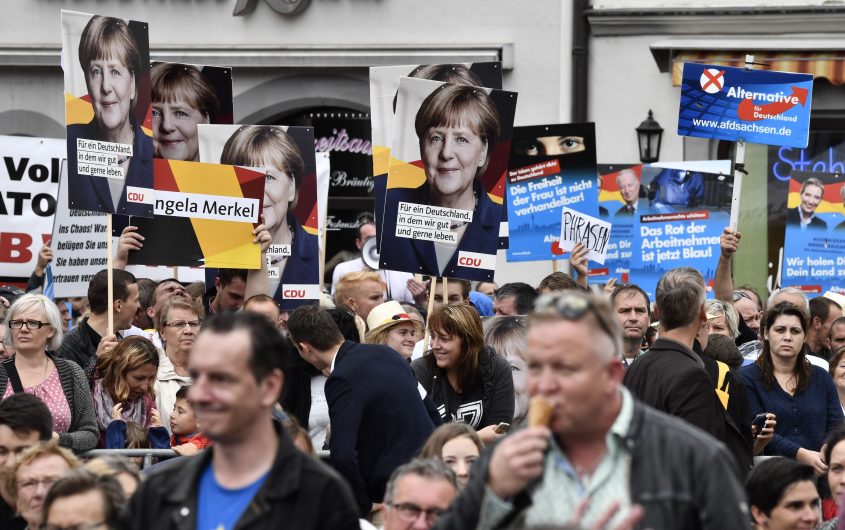
JOHN MACDOUGALL/AFP/Getty Images
The German Election Only Looks Boring

Stephen F. Szabo
Senior Fellow
Dr. Stephen F. Szabo is a Senior Fellow at AICGS, where he focuses on German foreign and security policies and the new German role in Europe and beyond. Until June 1, he was the Executive Director of the Transatlantic Academy, a Washington, DC, based forum for research and dialogue between scholars, policy experts, and authors from both sides of the Atlantic. Prior to joining the German Marshall Fund in 2007, Dr. Szabo was Interim Dean and Associate Dean for Academic Affairs and taught European Studies at The Paul H. Nitze School of Advanced International Studies, Johns Hopkins University. He served as Professor of National Security Affairs at the National War College, National Defense University (1982-1990). He received his PhD in Political Science from Georgetown University and has been a fellow with the Alexander von Humboldt Stiftung, the Woodrow Wilson International Center for Scholars, and the American Academy in Berlin, as well as serving as Research Director at AICGS. In addition to SAIS, he has taught at the Hertie School of Governance, Georgetown University, George Washington University, and the University of Virginia. He has published widely on European and German politics and foreign policies, including. The Successor Generation: International Perspectives of Postwar Europeans, The Diplomacy of German Unification, Parting Ways: The Crisis in the German-American Relationship, and Germany, Russia and the Rise of Geo-Economics.
The consensus on this week’s election in Germany is that it has been a boring campaign, it’s outcome a done deal, and that we can all look forward to four more years of Chancellor Angela Merkel. However, this may turn out to be one of the least predictable elections in recent German history. It is clear that Angela Merkel and the Christian Democrats, with their Bavarian sister party the CSU, will emerge as the largest group in the new Bundestag and that Merkel will be chancellor. A recent Forschungsgruppe Wahlen poll revealed that 83 percent of those polled believe Merkel and the Union will win the election. However, the same poll found that support for the CDU/CSU has dropped 2 points to 36 percent (compared to 23 percent for the SPD) and that the most likely coalition partner, the Free Democrats (FDP), is polling at 10 percent. The Alternative for Germany (AfD) is gaining strength and is also polling at 10 percent, while the Left Party is at 9 percent and the Greens at 8 percent. The prospect of a six party Bundestag seems to be certain. If these numbers hold, the only possible coalitions will be another so-called Grand Coalition of the CDU/CSU and SPD or a Jamaica coalition between the Christian Democrats, the Greens, and the FDP. The best outcome for a clear governing coalition would be a CDU/CSU-FDP government, but the numbers do not appear to be there for this. There is also the unprecedented option of a minority CDU/CSU government followed by early elections.
The outcome remains uncertain, as 39 percent report themselves still undecided about how they will vote. This probably refers to how they will vote on their second ballot for the party list. In the German system, voters have two ballots, one for a single member district representative and the second for the party list in their state. The final allocation of seats depends primarily on the second party list vote. This encourages many voters to be tactical and to split their votes. As the Christian Democrats will win a larger majority of the first ballot constituencies, the tactical voting comes on the second ballot where the small parties come into play. Many CDU voters may vote for the FDP on the second ballot or they may fear undercutting the CDU and stick with their party. The other parties will have similar sorts of decisions to make. Turnout will be crucial and it is expected that a large turnout (say in the upper 70 percent range) will benefit the chancellor and her party. Finally, there is the 5 percent clause, which means any party gaining less than 5 percent is out and the final proportion of seats is allocated only to those who are over this hurdle. Currently this looks like about 4 percent of the votes will drop out for the final allocation of seats.
On Sunday, the key question will be the total seats won by the CDU/CSU and FDP. Will they squeak through with a slim majority? If so, then expect a major struggle over who will be finance minister. FDP leader Christian Lindner has made it clear that a precondition of a coalition with the Christian Democrats will be the Finance Ministry for the FDP (i.e., for Lindner). This will mean the end of the reign of Wolfgang Schäuble in what has been the most powerful office in the EU after that of the German chancellor. Lindner has also been a hawk on Eurozone issues, making a compromise with France on this key set of policies more difficult. This would open up the Foreign Ministry to the CDU for the first time in fifty years. Given that this will be Merkel’s final term as chancellor, the foreign minister will be well positioned to succeed her. The succession issue will dominate the post-election environment as Merkel’s power will begin to recede as she becomes more of a lame duck as her term goes on. An added new surprise is the reemergence of Karl-Theodor zu Guttenberg, the former defense minister, who campaigned effectively and is being pushed by the CSU leader, Horst Seehofer, for a Cabinet seat.
If the Jamaica coalition emerges with the Greens and the FDP, then Merkel will have less pressure on her from the right as she can play the Greens off against the FDP, the right in her party, and the CSU—but it will mean fewer Cabinet positions for Christian Democrats. Another Grand Coalition will look much like the current one, although it is not clear if the SPD would push for Finance or retain the Foreign Ministry. It seems likely that Martin Schulz will not be able to remain as party head and in the Cabinet if the SPD vote remains below 25 percent. However, many believe this would be the last government in which the SPD would have a role, as it would lose even more support—which it’s already been losing with its centrist junior coalition partner strategy.
Finally, there is the matter of the vote for the AfD. It could emerge as the third largest party in the Bundestag, which would produce tremors in the political landscape. The emergence of an extreme right party in the Bundestag would mean they would have continuous access to the public through Bundestag debates, and would be eligible for public financing for their campaigns and for political education through their political foundation.
All in all, this election may be full of surprises. The boring Germans may be more exciting than many hope.








